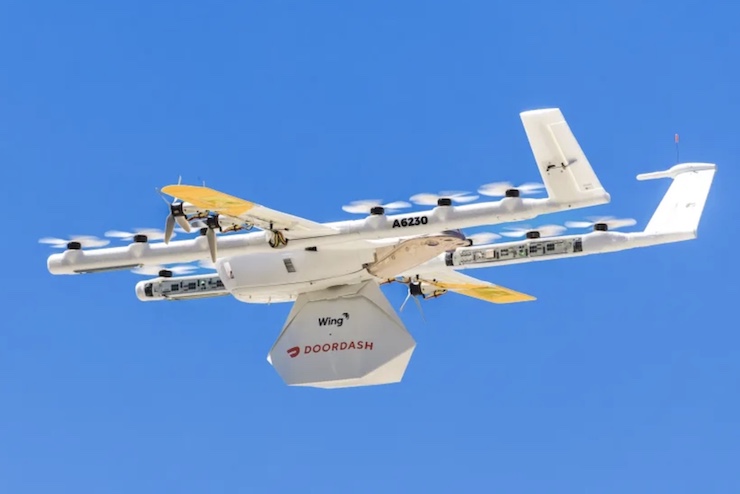
Scalability remains the Holy Grail of retail drone delivery companies. Making “last mile” deliveries from a single store outlet to a nearby individual customer, then returning to the drone’s original launch site is a useful demonstration project. It proves that aerial drone deliveries can be made safely – and on time. But unless the company charges an enormous delivery fee, it won’t be a profitable operation over the long haul. And it’s highly inefficient to boot.
Numerous companies currently pioneering “last mile” deliveries in small suburbs want the FAA to grant them authority to operate multiple drones across longer distances, without the need for visual observation, remote piloting or a return flight to home base. It means fewer wasted flight miles, reduced operating expenses and for prospective customers, faster deliveries. From the standpoint of scalability, it makes perfect sense.
One such company seeking FAA approval is Wing, a subsidiary of Google’s parent company Alphabet, which established itself last year in the Dallas-Ft. Worth area as a drone partner of Walmart. Wing has just applied to the FAA for authority to make up to 400 deliveries a day from each of its 25 drone hubs, or “nests,” as the company calls them. The nests – spread out within a 6-mile radius – will allow Wing not only to make consecutive flights on behalf of Walmart, but to do so on behalf of all retailers and their customers within the same broad geographic area. Walgreens and DoorDash, two other Wing partners, are also supporting the plan.
Wing hasn’t built its drone nests yet but is fully prepared to do so. Its plan includes the establishment of “vertiports” in shopping mall parking lots – depending on local land use requirements – as well as the placement of ground-based sensors across the entire operating area to scan the skies and maintain airborne safety. The company calls its vision the “Wing Delivery Network.” It may be the most ambitious bid for drone scalability yet.
Wing’s track record overseas gives it an important leg up over its competitors, many of whom are just getting started or like Amazon, encountering persistent technical difficulties. Wing enjoys a proven track record with long distance BVLOS flights in Australia where it’s already delivered 300,000 packages weighing 3 pounds or less over the past several years. But the company clearly has ambitions of emerging as a dominant player in the retail delivery market, with plans to deploy larger cargo drones with heavier payloads that can accommodate large commercial enterprises and medical suppliers with B2B delivery needs (areas currently being pioneered by UPS, FedEx and Zipline),
Wing’s proposal to the FAA also takes into account concerns about noise pollution that have arisen with Walmart’s other drone partners – especially Drone Up – in Arizona and elsewhere. All of Wing’s proposed drone nests will be located at least 75 feet away from noise-sensitive areas – and even further away (300 feet or more) in the case of Class B and Class D airspaces (i.e. near local airports). In addition, all Wing deliveries will be restricted to daylight working hours up to 7 p.m. (Holiday events and promotions may enjoy expanded hours but will require special permits).
The FAA has given tentative approval to Wing’s proposal, pending the outcome of a formal stakeholder review. Interested parties can comment on Wing’s proposal by October 9, 2023. While many operational details will require additional refinement, Wing is likely to move forward with some version of its plan by early 2024.
|